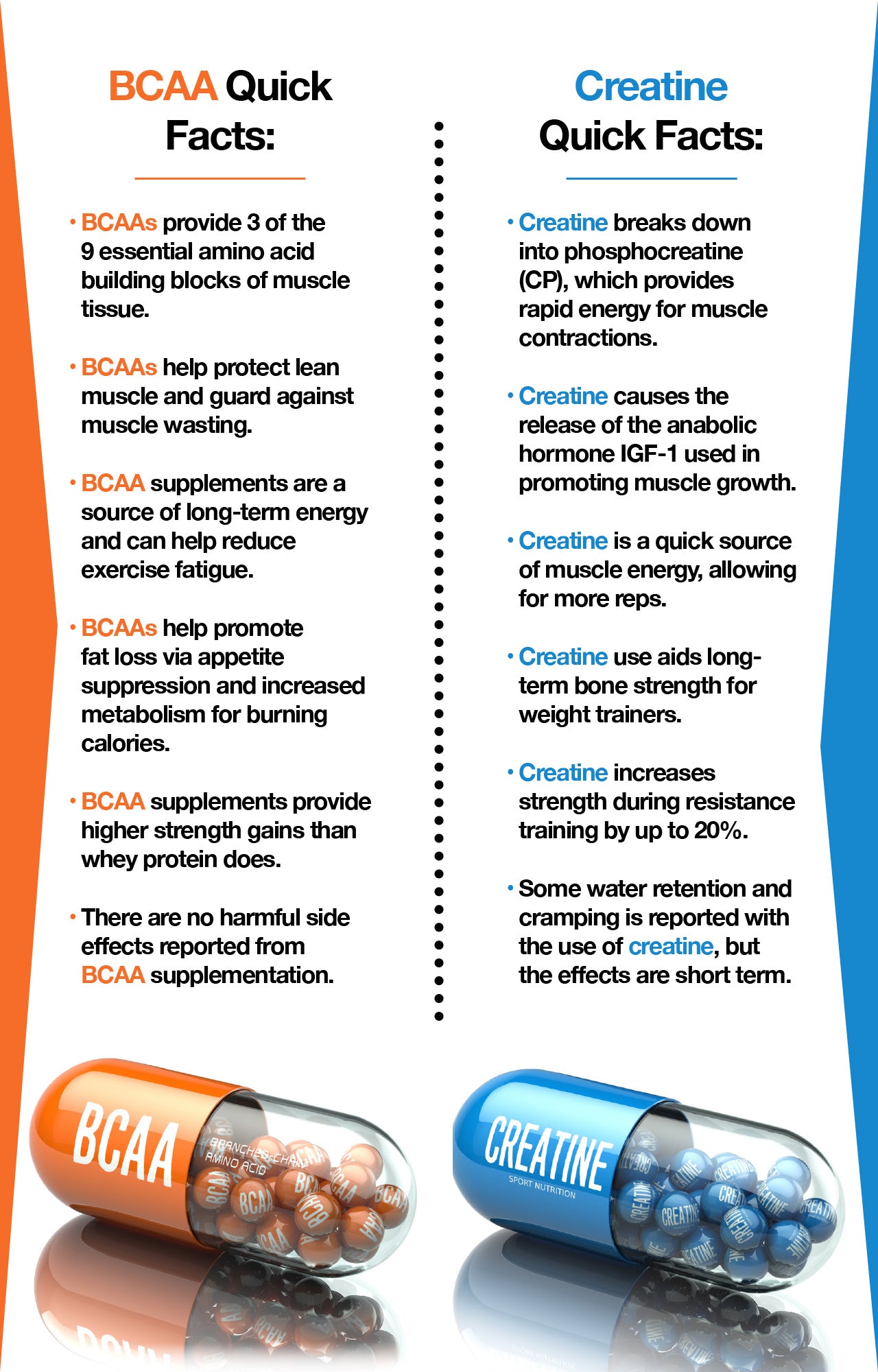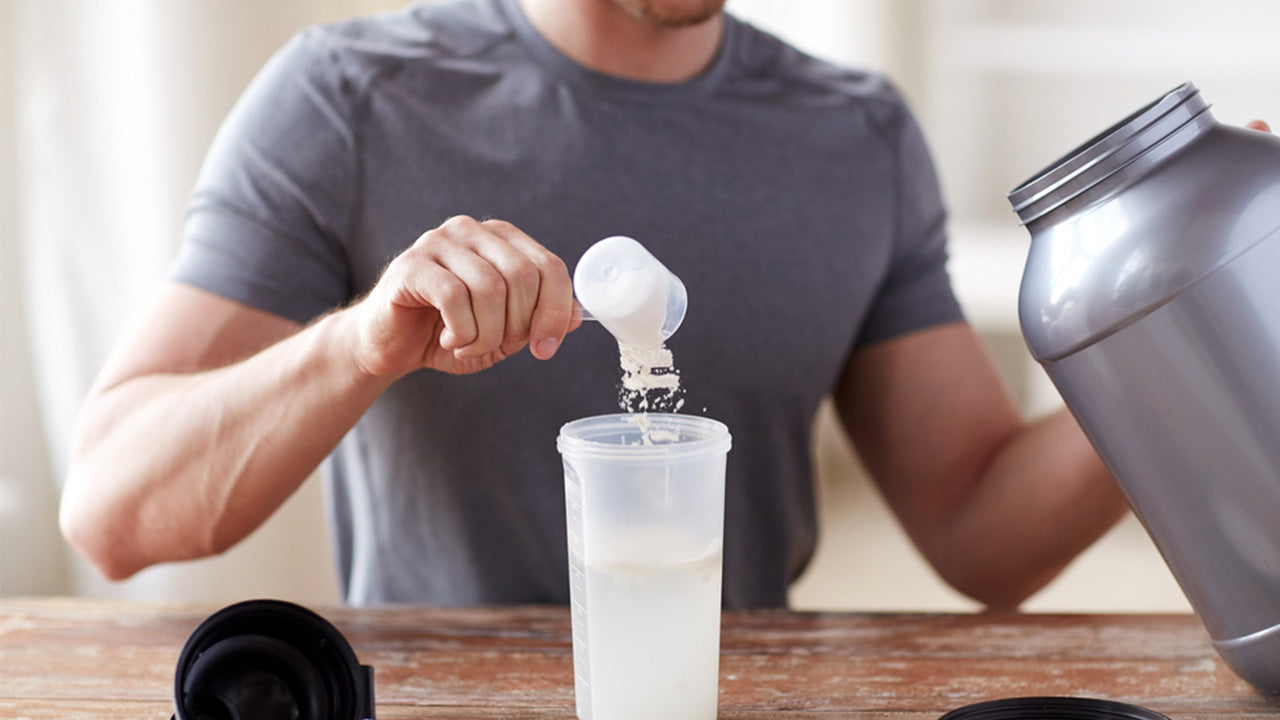BCAA vs. Creatine: What You Need to Know
 By: by Amino Science
By: by Amino Science

If you spend enough time in the gym, you will eventually run across this question: BCAA vs. creatine, which supplement do you prefer? Before you can answer that question, you'll need the information behind both BCAAs and creatine: what are they? What are the upsides and downsides to each? How can they help build muscle? Can they both be taken together? You'll find the answers to all of those questions here, plus learn about the one ultimate supplement that perfectly marries the two together, so you never have to compromise for imbalance in your muscle-building nutrients.

What Is BCAA? What Is Creatine?
We'll start with the definitions, and then move on to the differences between these two supplement options.
BCAA: Branched-Chain Amino Acids
A BCAA supplement is made up of branched-chain amino acids, specifically the three amino acids leucine, isoleucine, and valine. There are a total of nine essential amino acids, essential because you must eat or otherwise consume them to get them (other amino acids are produced in-house by your body). Leucine, valine, and isoleucine are essential amino acids.
"Branched-chain" refers to the molecular structure of these three specific amino acids. The chemical bonds branch off of the main structure.
Studies have shown that BCAAs help reduce muscle damage and soreness in post-workout recovery.
While it's possible to get a sufficient amount of the BCAAs from your diet, for those who work out intensively, and/or for those on specific diets aimed to lose weight, it might be difficult to get the right amino acid balance, which is why some will chose a BCAA supplement in the hope that it will round out their nutrients. However, it should be noted here that muscle synthesis cannot take place without all nine essential amino acids, so a complete essential amino acid (EAA) supplement is preferable to a BCAA one—you cannot build muscle with only a third of the necessary ingredients.
To cut calories without having a negative impact on protein intake for muscle mass is important, and BCAAs are often taken to try to ensure there's no interruption to protein synthesis while dieting. Even if weight loss isn't your goal, the BCAAs gained from taking a complete EAA supplement might still help in that department by contributing to appetite control.
BCAAs have similar benefits to a whey protein shake, but with fewer calories. Moreover, the amino acid leucine is one of the two specifically ketogenic amino acids, another way that BCAA supplements contribute to fat loss (the ketogenic diet is all about burning off fat, and doing it both quickly and safely).
BCAA supplements are perhaps best suited for CrossFitters, bodybuilders, or rowers, but again, they are only a third of the essential amino acids, all of which are necessary for muscle building.
BCAA Quick Facts
- BCAAs provide three of the nine essential amino acid building blocks of muscle tissue.
- BCAAs help protect lean muscle and guard against muscle wasting.
- BCAA supplements are a source of longer-term energy, and can help reduce exercise fatigue.
- BCAAs help promote fat loss via appetite suppression and increased metabolism for burning calories.
- BCAA supplements provide higher strength gains than whey protein does.
- There are no harmful side effects reported from BCAA supplementation.
Creatine: The Energy Protein
Creatine is creatine monohydrate, the protein found in animal sources of meat like fish, poultry, pork, and red meat. Creatine contains two different amino acids, arginine and methionine, of which methionine is essential.
Unlike the weight-loss potential in BCAA supplements, taking creatine can lead to initial weight gain, as it causes some water retention in the muscles. Likewise, if you're not drinking enough water while taking creatine, cramping can occur, meaning it's more important than ever to stay hydrated while working out.
Researchers have stated that creatine might help lessen the effects of osteoarthritis, slowing the loss of bone mass as you age. Another unique benefit of creatine is its ability to deliver the rapid energy that is needed during fast muscle contractions (when sprinting, for example). That means creatine gives you longer endurance, which means more reps, which means more muscle growth. This is why creatine is best suggested for powerlifters or sprinters, and why it's a part of our unique EAA blend (see below for further details).
Creatine Quick Facts
- Creatine breaks down into phosphocreatine (CP), which provides rapid energy for muscle contractions.
- Creatine causes the release of the anabolic hormone IGF-1, used in promoting muscle growth.
- Creatine is a quick source of muscle energy, allowing for more reps.
- Creatine use aids long-term bone strength for weight trainers.
- Creatine increases strength during resistance training by up to 20%.
- Some water retention and cramping is reported with the use of creatine, but the effects are short term.
BCAA vs. Creatine: Which Should You Use?
If you're here to make a choice, now's the time to review your fitness goals and how each of these products might influence them. Research suggests that BCAAs help to increase muscle mass for those doing resistance training. If your diet is low on protein intake, say if you're vegetarian or vegan, BCAA supplements are a great way to promote muscle protein synthesis, but remember that they are also only a partial supply of the amino acids you need for muscle building.
Likewise, a study also showed that muscle strength increased up to 8% for those using a creatine supplement while resistance training. Creatine can provide rapid energy when the usual muscle cell energy supply of adenosine triphosphate (ATP) is slow to regenerate, and it goes a long way towards the kind of strength building and increase to muscular force that might be preferred by powerlifters.
Both supplements aid muscle recovery, both contain at least one essential amino acid, both help drive protein synthesis, both of them are good to take as pre-workout supplements for their benefits, and honestly, unless you have a specific reason to not take one of them, you may be thinking that you want to take both. Well good news for you then, because you can! In fact, we recommend that you do.
BCAA and Creatine Together
You may have noticed that there was no overlap between the amino acids from BCAA supplements and creatine supplements, which means taking both will not overdose you on any one amino acid. Rather than think of them as enemies in some competition for supplement supremacy, BCAAs and creatine can be two valuable players on the same team: your team. Nothing bad will happen to you if you combine them (they're not baking soda and vinegar in a third grader's science fair volcano or anything), and since they both aid sports performance, boost muscle building, help with fat loss, and ease muscle recovery, when taken together you may see improved results in all of those categories.
However, if you're after a full roster of the essential amino acids, there are amino acid supplements that include all three BCAAs, plus the other muscle-building EAAs. Whether you're looking into supplementation because you're lifting weights or attempting to lose body fat or both, a protein powder with only partial, unbalanced amounts of amino acids just won't do the trick.
A Complete EAA Blend
When it comes to muscle-building supplements, our blended EAA formula not only contains eight of the nine essential amino acids, including the BCAAs, but it also supplies them with the energy of creatine and the steady amino acid digestion that comes from whey protein supplements (derived from milk).
This supplement is scientifically proven to increase human muscle growth and can help prevent muscle breakdown in the elderly. It was also designed to contain the exact ratio of amino acids needed to build muscles without overtaxing your body with excessive or unnecessary amounts of any one.
When building muscle, you don't want to show up with a partial supply of the building blocks of protein. Instead, you want a comprehensive EAA supplement that helps all the work you do weight training at the gym to pay off. Instead of a dose of BCAAs here or a dash of creatine there, we recommend you get the most out of all of the above with our combination of EAAs with creatine and whey protein support. If the question is BCAA vs. creatine, the real answer is The Amino Company's blends: for balance, for building, for the best of both worlds and more.

Up to 25% off Amino
Shop NowTAGS: supplements
Join the Community
Comments (0)
Most Craveable Recipes




 833-264-6620
833-264-6620



















